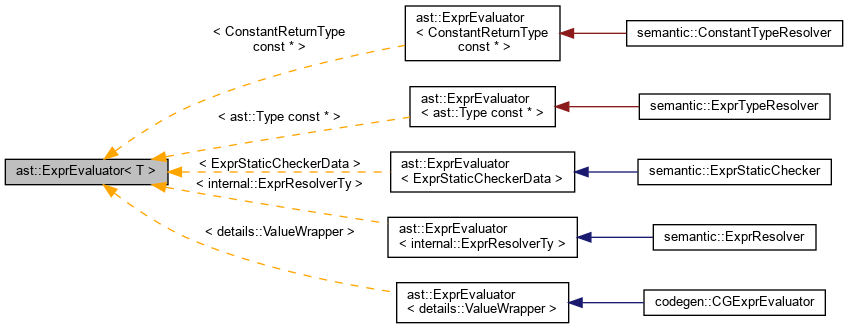ast::ExprEvaluator< T > Class Template Referenceabstract
Inheritance diagram for ast::ExprEvaluator< T >:

Public Member Functions | |
| T | Evaluate (Expr *expr) |
| Evaluates the given expression. More... | |
| virtual T | EvaluateList (ExprNodeList subexpr) |
| Evaluates the given subexpression. More... | |
Protected Types | |
| using | op_array = std::pmr::vector< T > |
Protected Member Functions | |
| virtual T | mapValue (exprnode::ExprValue &node) const =0 |
| virtual T | evalBinaryOp (exprnode::BinaryOp &op, const T lhs, const T rhs) const =0 |
| virtual T | evalUnaryOp (exprnode::UnaryOp &op, const T rhs) const =0 |
| virtual T | evalMemberAccess (exprnode::MemberAccess &op, const T lhs, const T field) const =0 |
| virtual T | evalMethodCall (exprnode::MethodInvocation &op, const T method, const op_array &args) const =0 |
| virtual T | evalNewObject (exprnode::ClassInstanceCreation &op, const T object, const op_array &args) const =0 |
| virtual T | evalNewArray (exprnode::ArrayInstanceCreation &op, const T type, const T size) const =0 |
| virtual T | evalArrayAccess (exprnode::ArrayAccess &op, const T array, const T index) const =0 |
| virtual T | evalCast (exprnode::Cast &op, const T type, const T value) const =0 |
| SourceRange | argLocation (int arg_index) |
| Gets the location of the argument at the given index. More... | |
| virtual bool | validate (T const &) const |
| virtual bool | validatePop (T const &) const |
| int | opStackSize () const |
| SourceRange | argLocation (int argno) const |
| Gets the location of the argument at the given index. Note the 0th argument is the first argument, not the operator. More... | |
Detailed Description
template<typename T>
class ast::ExprEvaluator< T >
Definition at line 12 of file ExprEvaluator.h.
Member Function Documentation
◆ argLocation() [1/2]
template<typename T >
|
inlineprotected |
Gets the location of the argument at the given index.
- Parameters
-
arg_index The index of the argument.
- Returns
- SourceLocation
Definition at line 38 of file ExprEvaluator.h.
References SourceRange::SourceRange().
◆ argLocation() [2/2]
template<typename T >
|
inlineprotected |
Gets the location of the argument at the given index. Note the 0th argument is the first argument, not the operator.
- Parameters
-
argno The index of the argument.
- Returns
- SourceRange The location of the argument.
Definition at line 139 of file ExprEvaluator.h.
◆ Evaluate()
template<typename T >
|
inline |
Evaluates the given expression.
- Parameters
-
expr The expression to evaluate.
Definition at line 49 of file ExprEvaluator.h.
virtual T EvaluateList(ExprNodeList subexpr)
Evaluates the given subexpression.
Definition: ExprEvaluator.h:55
References ast::ExprEvaluator< T >::EvaluateList().
◆ EvaluateList()
template<typename T >
|
inlinevirtual |
Evaluates the given subexpression.
- Parameters
-
subexpr The list of expression nodes to evaluate.
Definition at line 55 of file ExprEvaluator.h.
References ast::ExprNodeList::nodes(), and ast::ExprNodeList::size().
Referenced by ast::ExprEvaluator< T >::Evaluate().
The documentation for this class was generated from the following files:
- include/ast/ExprNode.h
- include/ast/ExprEvaluator.h